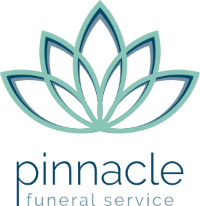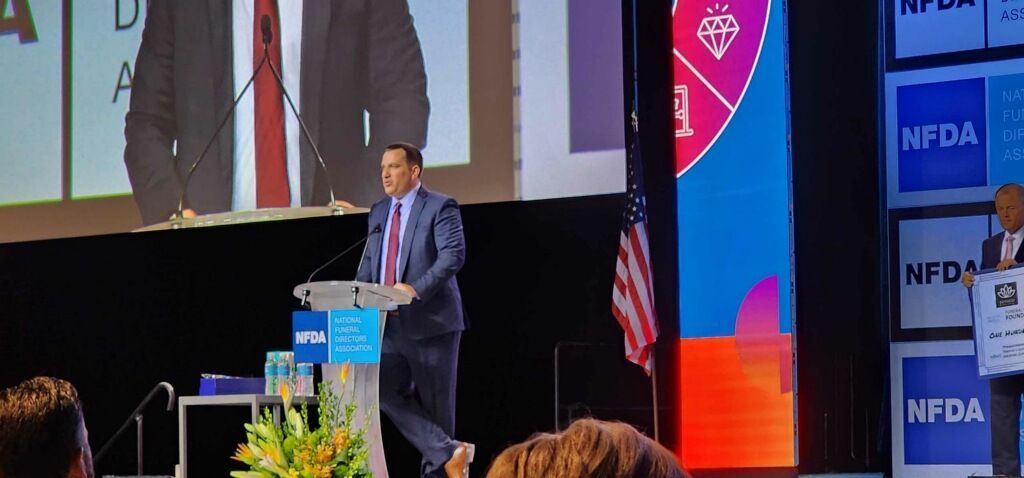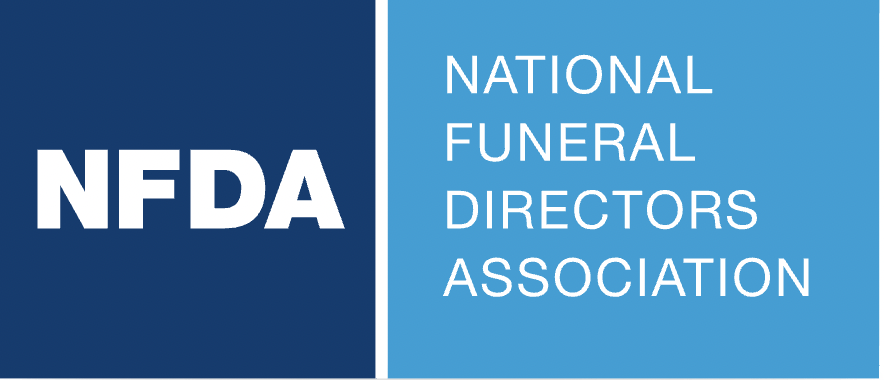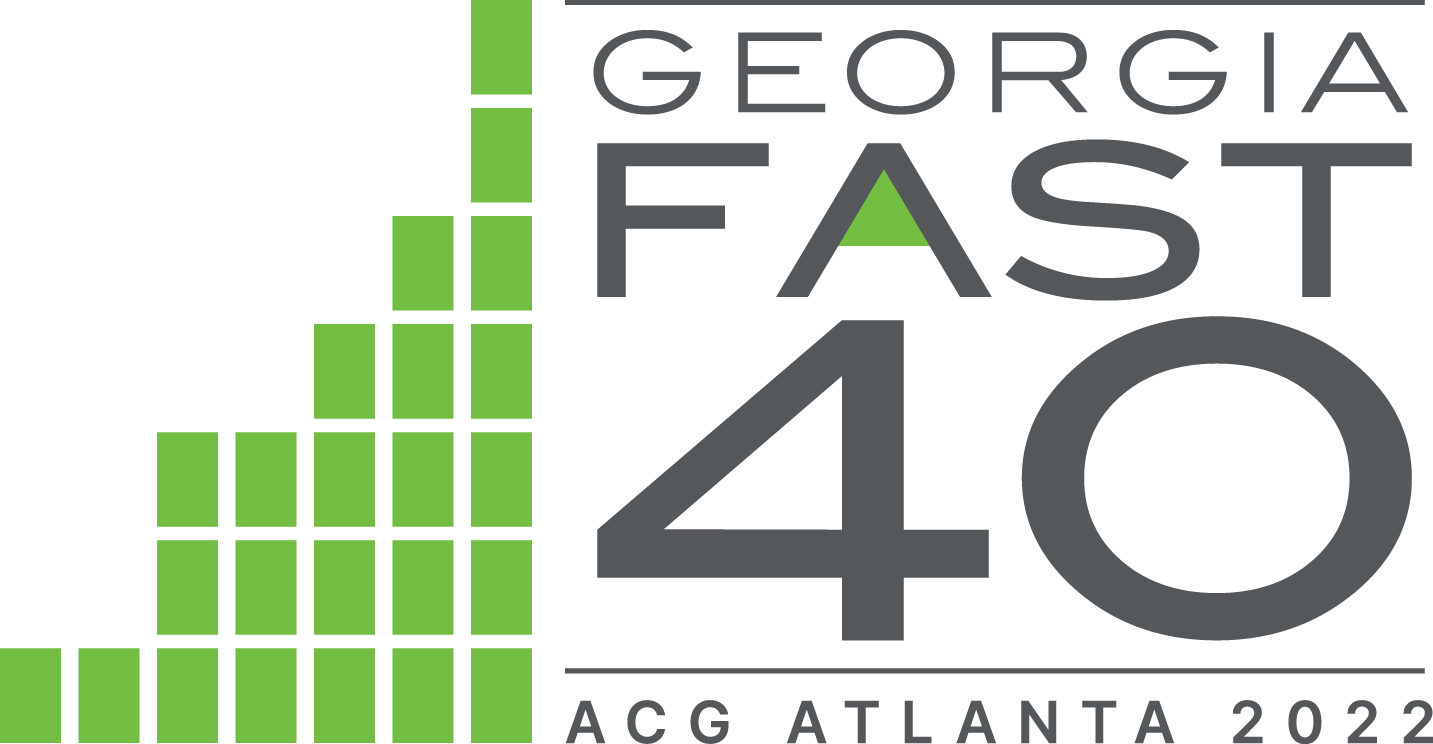President Tony Kumming Funeral Vision Interview
Finding His Destiny: Tony Kumming Takes The Not-So-Obvious Path

Tony Kumming had just graduated from Ball State University with a degree in mathematical economics.
But he needed to find something to do before heading off to law school.
So, he got a job at the funeral home consolidator located in the Tampa Bay area, where he’d once lived, and which was near the law school he planned to attend.
“I had about nine months to do whatever I wanted,” Kumming, now 40, explained about that period of transition in 2007. “And I got a job at the Keystone Group in downtown Tampa. And during that time, I quickly realized I enjoyed the people I worked with.”
Those “people” are individuals that you may know quite well: They have names like Jim Price, Will Bischoff, Bob Horn, Steve Tidwell and Steve Shaffer.
Shaffer helped Kumming realize his destiny more than any other.
“I was just looking for jobs in the area, and ironically, Steve Shaffer and my mother are first cousins,” he explained. “My uncle had recently passed away, and my parents and Steve were at the funeral together.”
And that is how he learned that there might be an opportunity for him at Keystone, working in the corporate development department.
He interviewed with Bischoff and was offered an entry-level position, analyzing whether certain funeral homes might be good acquisition candidates.
“I was there for three years before the company was sold to SCI,” he said.
Shaffer and Price ended up teaming up with Sterling Partners to launch Foundation Partners Group, which acquired some of the Keystone firms that SCI was required to sell as part of the deal. As a result, one day Kumming was working for Keystone and the next he was working for FPG in the exact same office as it simply took over the lease.
He did, in fact, go to law school – although only part time – earning his law degree from Stetson University College of Law in 2010 and passing the Florida bar exam.
“At the time, being young and with no family, and with nothing else to compare it to, it didn’t seem crazy,” he said of going to law school while working. “But looking back, it was really like doing two full-time jobs. Thankfully, Stetson has a part time program, so all my classes were at night. So, it never interfered with work.”
Asked about Shaffer, he notes that although they are cousins, he never knew him before getting the job at Keystone. “My mom is one of five and Steve is one of nine, and they lived three houses down from each other growing up, but I didn’t know Steve until I started working at Keystone,” he said.
But Shaffer and those other titans of funeral service played a collective role in convincing him that a full-time job as a lawyer wasn’t the path he was meant to walk down.
“A lot of things in life come down to people,” Kumming said. “And the people in the profession and the people I worked with at Keystone were great.”
He also sensed on a gut level that there were incredible opportunities in funeral service, just there for the taking for someone eager to grab them – someone like him.
“From the late 1990s to 2007, when I entered the profession, not many transactions had happened, and I had been told the baby boomers were coming – and lots of them would want to sell their business,” he said. “I enjoyed the work and who I was working with … and the opportunity was compelling.”
What was also compelling was Candice, who he met when he joined Keystone in 2007. She was a sales administrator at Keystone.
“We’ve known each other almost 20 years and have been married for eight,” he said, joking that it took him awhile to convince her to go out with him – and then it took her awhile to convince him to get married.
“She was working at Keystone when I started,” he said, noting that they went on their first date almost four years later. Asked if he liked her from the start, he said, “Yes, definitely. It was something that I knew immediately.”
The two have a 6-year-old daughter and a 4-year-old son, and they live in Treasure Island, Florida. While Candice left the workforce for a time, she now serves as a consultant for Pinnacle’s accounting team.
Tony Kumming, his wife, and their two children.
Finding His Way
At Keystone, Kumming says he “really developed a passion for the funeral profession,” noting that it was not lost on him that he essentially “stumbled upon” a career while waiting to go to law school.
After FPG bought the collection of Keystone firms, Kumming worked for his new employer for about two years.
Asked about the executives at Keystone, he said they were all mentors, even if they were not trying to intentionally guide him to a career in the profession. “I think their passion came through with what they were sharing with me,” he said. “I could tell that their careers were rewarding for them personally and professionally.”
At FPG, it was the same office and a lot of the same people – and the same type of work. But there were real differences.
“It was funded by people without experience in the funeral profession – and it was eye opening to see different approaches to the same issue,” he said. “It really made me realize the need to listen to people in the profession – not to say there is only one way to do something. But I think the fact I was at FPG only a couple of years until I left is a strong sign of which one I prefer.”
In fact, listening is one of the best pieces of advice he said he can give others.
“I use the people I trust for guidance,” he said. “I talk about anything with former owners or just to get business, leadership or management advice. I use the relationships I have built – and that is available to everyone. That is something that might be underutilized in today’s world.”
While he’s not a licensed funeral director, Kumming would like to one day change that.
“I believe that will be in my future,” he said, noting that he may be able to do a better job relating to staff if he becomes licensed. “I’m not afraid to roll up my sleeves, and I recently went out on my first removal,” he said. “I think it is valuable for people who work at a funeral home to understand and believe everyone in the organization is marching to the same drum.”
After figuring out that he did not want to stay at FPG, Kumming – for a time – considered leaving the profession.
“I was looking at different things … one that clearly made a lot of sense was looking at the law profession,” he said. “I interviewed at a couple of law firms and had a job proposal, but during that time, we had worked on a couple of deals … and I got to know Jeff Boutwell, who started the NewBridge Group in the late 1990s after leaving Thomas Pierce.”
It was a natural progression to go from a firm that focused on buying funeral homes to working for NewBridge, which, at the time, served as a broker for firms looking to sell.
“I used my experience on the buy side to succeed in my role at NewBridge,” he explained.
As for teaming up with Boutwell, he’s thankful to have had the chance.
“He’s done and seen everything in funeral service from an ownership and management perspective and has an ability to see what’s coming,” Kumming said. “And he goes about his business in a fair and honest way.”
Tony Kumming with a combination of Pinnacle Funeral Service and Vineyard Capital Partners colleagues.
The Art of the Deal
Money, he observed, is – and should be – the biggest factor when selling a funeral home, but he thinks some other factors remain underappreciated.
That includes the connections owners have with the community as well as to individuals. “If you look at it from a 30,000-foot view, from the funeral home owner’s perspective, they are essentially getting into a long-term relationship with whoever they sell to,” he observed. “You have to feel confident that what you are signing up for is legitimate.”
When he joined NewBridge Group in 2012 as a senior adviser, he knew the company was primed for growth.
“It was really focused on the Southeast, being based in Atlanta,” he said. “I had some family in the Midwest, and I felt like over the years, that I had not seen as many opportunities there as you would anticipate.”
Kumming had a theory: The Midwest was an underserved market, and NewBridge could gain market share by making it a priority.
“We ended up being very successful,” he said.
When Boutwell shifted his focus to some other things, Kumming had the opportunity to become managing partner at NewBridge and eventually became its president. Along the way, NewBridge went through a metamorphosis.
“In 2019, we really started to shift our focus from the sell side to more of a buy-side representation,” he said.
Asked why the company made the adjustment, he said, “We went through a process of looking back at all of our prior clients and did a deep dive to research what was successful and what wasn’t. We learned that a lot of times a seller who sold for the last top dollar wasn’t necessarily the happiest.”
What often ended up happening is that since the “winning bidder” was usually the one who paid the most – and since most companies use the same valuation methodology – they would end up making decisions to rationalize paying more than others.
And that usually meant big changes, such as slashing staff or raising prices, which could alienate members of the community that the seller had served for so long.
“Former owners, a lot of times, see reducing staffing cost as reducing service to their families and — I’m speculating — see that as a reflection of themselves.” He added, “The other side of the coin was that we found that the sellers who were the happiest were those that joined companies and leadership teams that they felt the most comfortable with and had commonalities. So, at NewBridge, we wanted to help sellers find their best-fit buyer for the most rewarding outcome.”
In the process, the firm represented two main clients: Rollings Funeral Service and Pinnacle Funeral Service, which was founded in 2006 by a group of investors, Vineyard Capital Partners, which is led by Boutwell, who serves as the group’s managing partner.
Kumming was intimately involved with the staff at Pinnacle over the years, and when the opportunity to lead the company as president presented itself, he was intrigued.
“I had a hand in the acquisition of those businesses,” he explained. “So, it was somewhat of a homecoming. I probably knew half of the people who worked at Pinnacle through my interaction with them at NewBridge.”
Growing Pinnacle
Last year, Pinnacle acquired about a half dozen firms, and it now owns 30 funeral homes and one cemetery in seven states: Georgia, North Carolina, Tennessee, Ohio, Indiana, Wisconsin and Illinois. Companywide, it has about a 70% cremation rate. Most of its rooftops operate their own crematory, but it has a handful of firms that work with a third party, Kumming said.
“This time last year, we had 25 funeral homes – and we have similar acquisition plans for the next year,” he said.
In addition to serving as president of Pinnacle, Kumming is also one of the investors in Vineyard Capital partners, which owns the company.
Although Pinnacle is almost 20 years old, it still does not have much name recognition, Kumming said. But that is something he’s seeking to rectify.
“Our plan is to remain privately owned in 20 years just like 20 years ago,” Kumming vowed. “That is probably one of our biggest value propositions when considering succession. Our company, our team, has been stable and will remain stable for many more years. That is something that a lot of people are looking for in a transition.”
What sellers have seen from some other companies, he noted, has given them a sense of unease.
“Sometimes, there have been promises that have not been delivered,” he said sadly. “Plans to grow the market … and then those plans go away. Promising to get into new markets and then that does not happen. Or, bringing in a new business model for local operations that is inconsistent with what the seller anticipated.”
The investor group behind Pinnacle, he said, has largely been the same throughout its lifetime. “Retired attorneys retired funeral directors, bankers and doctors – they see this as part of their retirement,” he said. “Generally, it is a friends and family type environment. We are open to new investments, but usually the opportunities are gobbled up by the current investors. On occasion, when we see opportunity, we can bring in new people, but it’s usually people already connected to me or someone else who is an investor … it’s kind of a web of people.”
As far as what types of firms Pinnacle seeks to acquire, it prefers businesses that are focused on cremation. “That is generally one of our biggest criteria,” Kumming said.
The company also looks at whether a potential acquisition is close to any firms it already owns. “Just because of the relationships we have built in states where we already are, that is usually where our acquisitions would be, but we are open to anywhere else,” he explained.
The type of firm Pinnacle acquires can vary greatly.
“As an example, last year we bought a business that did 70 calls, but we also bought one that did 500 cremations,” Kumming said. “The spectrum can be quite vast in the call amounts. The one that was 70 calls was essentially next door to an existing location and made sense. A 70-call firm in South Dakota, however, wouldn’t make much sense at all.”
Perhaps the biggest factor, however, that determines whether Pinnacle bids on a business is the team that is in place at the firm. Even if an owner is retiring, if they have identified someone to take over and run the business, that can be a huge deal, he said.
“While there are some things we do change, there is still a lot of autonomy at the location level to run the business,” he said.
Asked what he struggles with most in running Pinnacle, Kumming said “the people side of it.”
He explained, “They are our greatest asset, but there are also a lot of individual personalities you have to manage. I put a lot of time and effort into it given how important it is. You have to get your people tools and resources to be the most successful.”
Another tough task is making sure you are in compliance, with everything from keeping track of annual preneed reports, staying on top of licensing, responding to audits and filling out a tax return. “These things are necessary, but they are not something that necessarily adds value to us as a company or to the families we serve,” he said.
Kumming is enjoying his role at Pinnacle.
“I went from doing a lot of work to relying on others to do analysis and look at opportunities … and now I I spend that time on operational stuff,” he said.
Whether it’s focusing on building a more robust preneed program or enhancing a funeral home’s digital footprint, he says that he stays very busy at the helm of a company that serves about 6,000 families on an annual basis.
He’s excited about the growth that lies ahead, even if the pipeline may not be as full as it was a couple of years ago.
“The fact is there are headwinds we’ve all faced,” he said, referencing the pull-forward effect in the death rate as a result of COVID-19, higher interest rates and inflation.
He added, however, that we’re in a part of the year when it is typically slower.
“People are still busy finishing their year-end finances from the prior year,” he said. They want to get fresh, updated financials for projection purposes.”
For those wanting to make a change, however, now is as good a time as ever, he said.
“We are kind of in this post-COVID world where a lot of things are normalizing, and it’s little easier to see into the future and what that will look like,” he said.
That means buyers can be more confident in their proposals, which can favor sellers.







